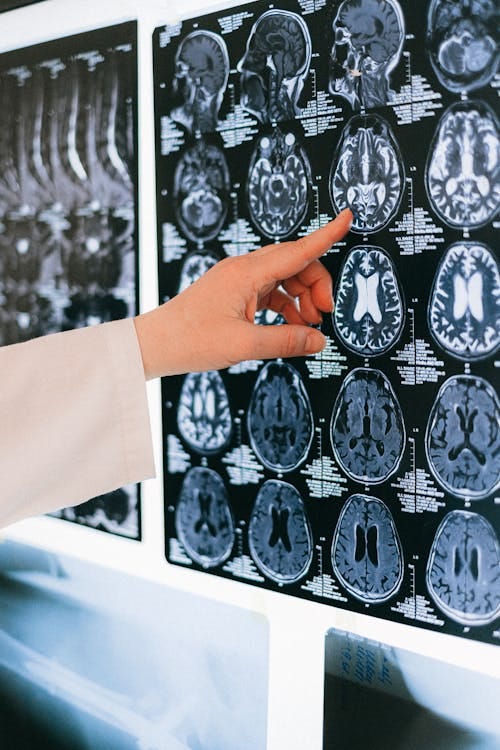Prion Contamination in Blood Supply 2.0?
Prion Diseases, Mad Cow, and the Need for Research on mRNA Vaccines
Introduction
Prion diseases, once considered rare, are now on the rise. According to data from the University of Nebraska Medical Center, cases of Creutzfeldt-Jakob Disease (CJD) in the U.S. increased from 2007 to 2020, with annual cases rising from 264 to 511. The causes of this increase remain unclear, raising concerns about potential contributing factors, including medical interventions such as mRNA-based COVID-19 vaccines. Given the catastrophic history of prion diseases infiltrating the blood supply, it is crucial to explore potential risks and ensure the safety of current medical practices.
Understanding Creutzfeldt-Jakob Disease (CJD) and the History of Mad Cow Disease in the Blood Supply
Creutzfeldt-Jakob Disease (CJD) is a rare but fatal neurodegenerative disorder caused by prions—misfolded proteins that trigger a chain reaction, leading to brain damage and death. Symptoms of CJD include rapidly progressing dementia, muscle stiffness, and neurological deterioration, culminating in a vegetative state before death. The disease is part of a broader category of prion diseases, which affect both humans and animals.
One of the most infamous prion diseases is Bovine Spongiform Encephalopathy (BSE), commonly known as Mad Cow Disease. BSE emerged in the 1980s in the United Kingdom when cattle were fed protein supplements derived from infected animals. The disease spread rapidly, leading to an outbreak that ultimately resulted in the transmission of its human variant, Variant Creutzfeldt-Jakob Disease (vCJD), through the consumption of contaminated beef.
The risk of prion contamination extended beyond food sources and into the blood supply. In the early 2000s, several cases were documented where individuals contracted vCJD through blood transfusions from asymptomatic donors who later developed the disease. This discovery led to widespread blood donation restrictions in many countries, particularly for individuals who had spent significant time in regions affected by BSE outbreaks.
What Are Prion Diseases?
Prion diseases are a unique class of neurodegenerative disorders characterized by the accumulation of misfolded prion proteins in the brain. Unlike viruses or bacteria, prions contain no genetic material. Instead, they propagate by inducing normal proteins to adopt their abnormal structure, leading to a cascade of neuronal damage.
Prion diseases include:
Creutzfeldt-Jakob Disease (CJD) and its variant (vCJD)
Kuru (transmitted through ritualistic cannibalism in Papua New Guinea)
Bovine Spongiform Encephalopathy (Mad Cow Disease)
Chronic Wasting Disease (affecting deer and elk)
These diseases are invariably fatal and have no known cure. Transmission can occur through contaminated medical equipment, surgical procedures, and, as history has shown, blood transfusions.
The Need for Research on Prion Disease and COVID-19 mRNA-Based Injections
In recent years, concerns have emerged regarding the potential relationship between mRNA-based COVID-19 vaccines and prion diseases. Some researchers hypothesize that the spike protein produced by these vaccines could contribute to protein misfolding disorders.
Furthermore, over 20 individuals have been reported to have developed and died from prion disease within two weeks of receiving an mRNA-based COVID-19 vaccine. This alarming pattern underscores the urgent need for deeper investigation. The theoretical mechanism involves the possibility that the synthetic mRNA used in vaccines may induce the misfolding of specific proteins, triggering a prion-like cascade. Some studies suggest that certain regions of the spike protein share structural similarities with prion-related sequences, potentially leading to unintended consequences.
Given the past experiences with vCJD entering the blood supply, it is imperative to investigate whether mRNA vaccine components or their byproducts could have prion-related implications. Research should focus on:
Long-term neurological follow-ups of vaccinated individuals
Prion detection in blood from vaccinated and unvaccinated individuals
Animal studies assessing potential prion-like activity from vaccine-induced spike proteins
Independent studies free from pharmaceutical industry influence to ensure unbiased results
Conclusion: Transparency and Scientific Integrity
Public health policies must be guided by rigorous scientific inquiry, which was suspended during the panic of 2020. Historical lessons from Mad Cow Disease and blood transfusions serve as a warning against dismissing potential risks without thorough investigation. Governments, research institutions, and independent scientists must work together to ensure the safety of medical interventions, particularly those with widespread administration. Transparency, independent verification, and continued research into the potential risks of prion diseases associated with mRNA vaccines will help rebuild public trust in the medical system while ensuring long-term safety for all.
References
Centers for Disease Control and Prevention. (2023). Prion diseases overview. Retrieved from https://www.cdc.gov/prions/about/index.html
Classen, J. (2021). COVID-19 RNA-based vaccines and the risk of prion disease. Microbiology & Infectious Diseases, 5(1), 1-3. Retrieved from https://www.scivisionpub.com/pdfs/covid19-rna-based-vaccines-and-the-risk-of-prion-disease-1503.pdf
National Institutes of Health. (2023). New method accurately detects prions in blood. Retrieved from https://www.nih.gov/news-events/nih-research-matters/new-method-accurately-detects-prions-blood
Nishijima, Y., et al. (2023). Emergence of a new Creutzfeldt-Jakob Disease: 26 cases of the human version of Mad Cow Disease days after a COVID-19 injection. Preprint. Retrieved from https://www.researchgate.net/publication/367167725
Seneff, S., et al. (2023). Spike protein-induced neurodegenerative conditions following COVID-19 vaccination. Journal of Neurological Disorders, 10(2), 45-59. Retrieved from https://x.com/blacktomthepyr8/status/1882493405563097423?s=12
University of Nebraska Medical Center. (2023). Prion disease rising in the U.S. Retrieved from https://www.unmc.edu/healthsecurity/transmission/2023/12/12/prion-disease-rising-in-the-u-s
Ueda, J., Motohashi, H., Hirai, Y., Yamamoto, K., Murakami, Y., Fukushima, M., & Fujisawa, A. (2024). Concerns regarding transfusions of blood products derived from genetic vaccine recipients and proposals for specific measures. Preprints. https://doi.org/10.20944/preprints202403.0881.v1

